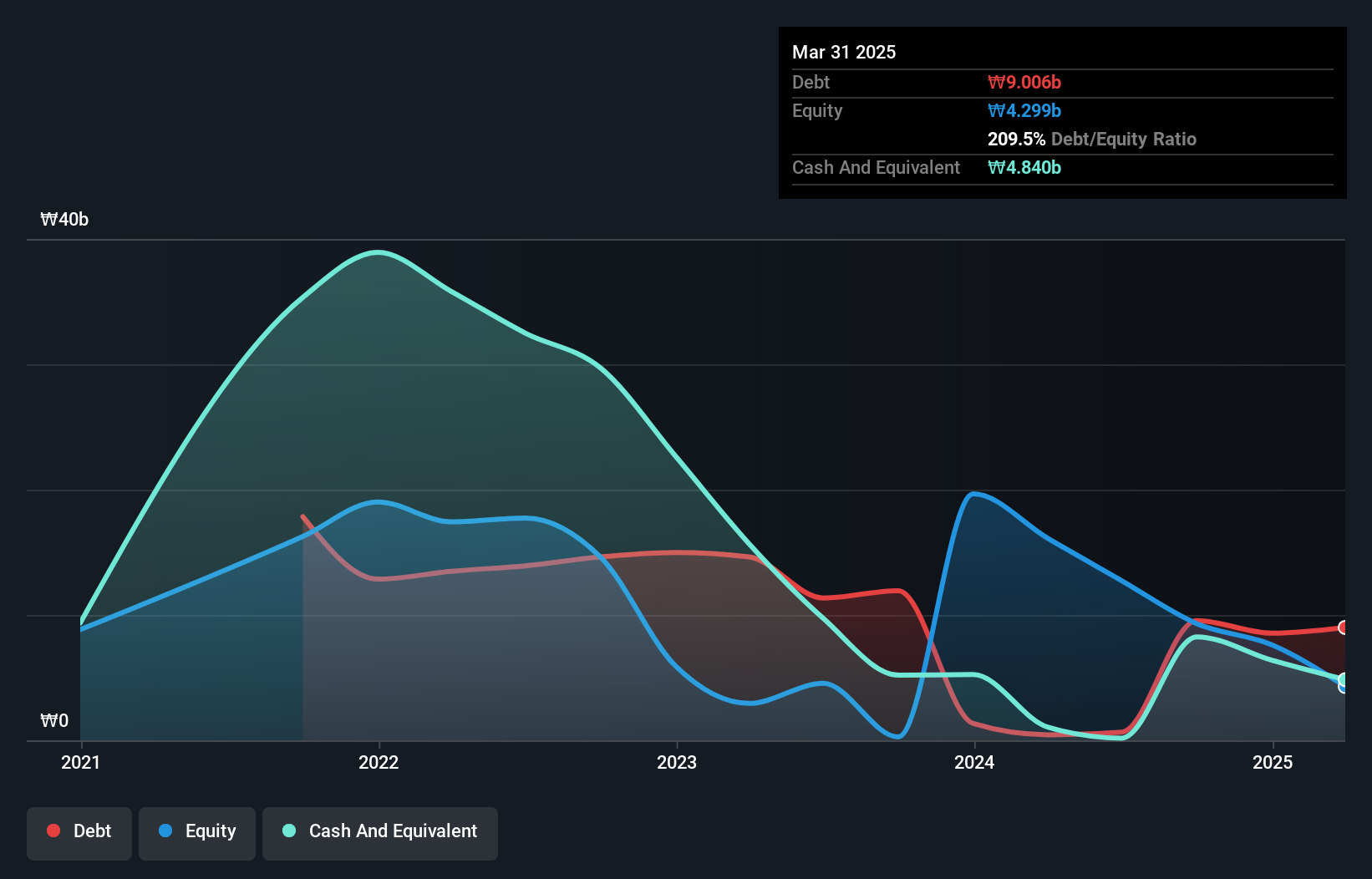David Iben put it well when he said, 'Volatility is not a risk we care about. What we care about is avoiding the permanent loss of capital.' So it seems the smart money knows that debt - which is usually involved in bankruptcies - is a very important factor, when you assess how risky a company is. As with many other companies PeopleBio, Inc. (KOSDAQ:304840) makes use of debt. But the real question is whether this debt is making the company risky.
Why Does Debt Bring Risk?
Debt is a tool to help businesses grow, but if a business is incapable of paying off its lenders, then it exists at their mercy. Ultimately, if the company can't fulfill its legal obligations to repay debt, shareholders could walk away with nothing. However, a more usual (but still expensive) situation is where a company must dilute shareholders at a cheap share price simply to get debt under control. Of course, debt can be an important tool in businesses, particularly capital heavy businesses. The first thing to do when considering how much debt a business uses is to look at its cash and debt together.
What Is PeopleBio's Net Debt?
You can click the graphic below for the historical numbers, but it shows that as of March 2025 PeopleBio had ₩9.01b of debt, an increase on ₩438.0m, over one year. However, it does have ₩4.84b in cash offsetting this, leading to net debt of about ₩4.17b.

How Strong Is PeopleBio's Balance Sheet?
The latest balance sheet data shows that PeopleBio had liabilities of ₩17.3b due within a year, and liabilities of ₩2.98b falling due after that. Offsetting this, it had ₩4.84b in cash and ₩3.39b in receivables that were due within 12 months. So its liabilities total ₩12.1b more than the combination of its cash and short-term receivables.
PeopleBio has a market capitalization of ₩51.0b, so it could very likely raise cash to ameliorate its balance sheet, if the need arose. But it's clear that we should definitely closely examine whether it can manage its debt without dilution. The balance sheet is clearly the area to focus on when you are analysing debt. But it is PeopleBio's earnings that will influence how the balance sheet holds up in the future. So when considering debt, it's definitely worth looking at the earnings trend. Click here for an interactive snapshot.
View our latest analysis for PeopleBio
In the last year PeopleBio had a loss before interest and tax, and actually shrunk its revenue by 9.2%, to ₩3.8b. We would much prefer see growth.
Caveat Emptor
Over the last twelve months PeopleBio produced an earnings before interest and tax (EBIT) loss. Its EBIT loss was a whopping ₩11b. Considering that alongside the liabilities mentioned above does not give us much confidence that company should be using so much debt. So we think its balance sheet is a little strained, though not beyond repair. Another cause for caution is that is bled ₩10.0b in negative free cash flow over the last twelve months. So in short it's a really risky stock. When analysing debt levels, the balance sheet is the obvious place to start. However, not all investment risk resides within the balance sheet - far from it. To that end, you should learn about the 4 warning signs we've spotted with PeopleBio (including 2 which are concerning) .
When all is said and done, sometimes its easier to focus on companies that don't even need debt. Readers can access a list of growth stocks with zero net debt 100% free, right now.
New: Manage All Your Stock Portfolios in One Place
We've created the ultimate portfolio companion for stock investors, and it's free.
• Connect an unlimited number of Portfolios and see your total in one currency
• Be alerted to new Warning Signs or Risks via email or mobile
• Track the Fair Value of your stocks
Have feedback on this article? Concerned about the content? Get in touch with us directly. Alternatively, email editorial-team (at) simplywallst.com.
This article by Simply Wall St is general in nature. We provide commentary based on historical data and analyst forecasts only using an unbiased methodology and our articles are not intended to be financial advice. It does not constitute a recommendation to buy or sell any stock, and does not take account of your objectives, or your financial situation. We aim to bring you long-term focused analysis driven by fundamental data. Note that our analysis may not factor in the latest price-sensitive company announcements or qualitative material. Simply Wall St has no position in any stocks mentioned.
About KOSDAQ:A304840
PeopleBio
A biotech company, develops bioproducts for diagnostic and treatment of protein misfolding diseases.
Slight risk with mediocre balance sheet.
Market Insights
Community Narratives




